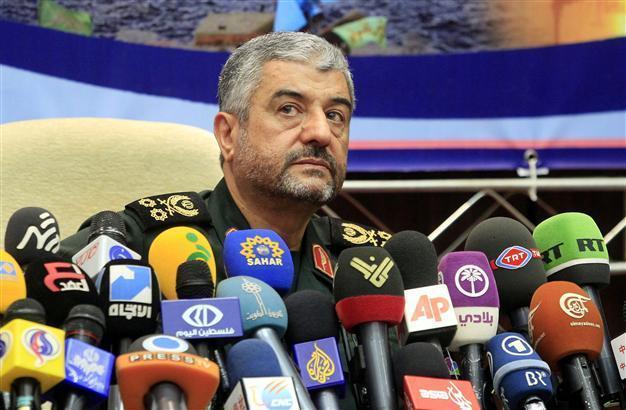Massive anti-mine naval exercise underway in Gulf
DUBAI - Agence France-Presse

Iran's Revolutionary Guards Commander Mohammad Ali Jafari speaks during a press conference in Tehran, Iran, 16 September 2012. EPA photo
Naval forces from more than 30 countries were on Monday engaged in a massive minesweeping exercise in the Gulf, US officials said, amid Iranian threats to block the strategic Strait of Hormuz.
The US-led International Mine Countermeasures Exercise (IMCMEX), the first of its kind in the Middle East, comes amid heightened tensions between Israel and Iran over the Islamic republic's controversial nuclear programme.
The exercise kicked off on Sunday, the same day as the head of Iran's Revolutionary Guards warned of retaliation against the Strait of Hormuz, Israel and nearby US bases if his country is attacked and as Israeli Prime Minister Benjamin Netanyahu claimed Tehran is "90 percent" toward having a nuclear bomb.
US defence officials insist the exercise is not aimed at Iran or any one country, but is simply designed to hone counter-mine capabilities among allies and partners.
"This (exercise) is not being conducted in response to any particular threat or any specific situation," Lieutenant Greg Raelson of the US Fifth fleet in Bahrain told AFP Monday.
"This exercise uses a scenario based on a violent extremist organisation to prepare for the possibility...(they) may use mines or a seaborne improvised explosive device to disrupt freedom of navigation," he added. US Vice Admiral John Miller, the head of the US Naval Forces in the wider Gulf region, echoed his comments.
"This exercise is about mines and the international effort to clear them," he said in a statement.
Analysts however argue that the anti-mine manoeuvres are designed to counter Iran's escalating threats to block the strategic straits.
This is "a message to all parties in the region: to the allies and Iran, that the US is ready to defend their common interests, keep the straits and maritime routes open and respond to any attacks against its bases in the region" said Riad Kahwaji, of the Institute for near East and Gulf military analysis in Dubai.
More than 500 ships, 60 percent of which are energy carriers, pass through the Straits every week, a strategic chokepoint that connects the Arabian Gulf, and some of the world's top oil producing nations to the rest of the world.
"This is a vital region where sea lanes and resources and international interests all intersect," said Raelson.
"Defending these interests against a sea mine attack is really a core mission of navy mine warfare... and this exercise is an effort to decrease the international threat of mining and to enhance our combined capabilities to provide long-term stability and security." The anti-mine manoeuvres will last through September 27 and involve more than 30 nations including the United States, Britain, Japan, France, Yemen and Jordan.
Raelson said no manoeuvres "at all" will take place in the actual Strait of Hormuz, adding that a variety of anti-mine techniques will be practised, including "mine-hunting operations, helicopter mine countermeasures operations, dive operations, small boat exercises and international cross platform refuelling training." General Mohammad Ali Jafari, the head of the Iranian Guards, told a news conference in Tehran on Sunday that the strait would be a legitimate target for Iran should it be attacked.
Jafari also suggested that US military bases -- the two largest in Bahrain and Qatar -- would be fair game for retaliation by Iran or proxy forces.
The US also has several military bases in Kuwait and a military presence in the United Arab Emirates.
And if Israeli jets or missiles struck Iran, "nothing of Israel will be left, considering its size," warned Jafari.
Netanyahu, speaking on two US political television talkshows, pressed the need for a "red line" on Iran's atomic activities, saying such a categorical bar had averted nuclear calamity with Russia during the Cold War and could ensure peace again. Washington says all options against Iran, including military action, remain on the table, but top officials reject "red lines" as political grandstanding that might leave them at a strategic disadvantage.
Western nations believe Iran is bent on acquiring nuclear weapons, despite repeated denials from Tehran which says its programme is for peaceful purposes only.
